

Ego death. Ego death is a "complete loss of subjective self-identity.
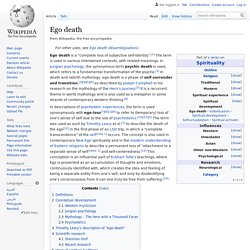
" Ontology. Study of the nature of being, becoming, existence or reality, as well as the basic categories of being and their relations Parmenides was among the first to propose an ontological characterization of the fundamental nature of reality.
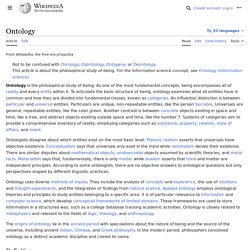
Etymology[edit] While the etymology is Greek, the oldest extant record of the word itself, the New Latin form ontologia, appeared in 1606 in the work Ogdoas Scholastica by Jacob Lorhard (Lorhardus) and in 1613 in the Lexicon philosophicum by Rudolf Göckel (Goclenius). The first occurrence in English of ontology as recorded by the OED (Oxford English Dictionary, online edition, 2008) came in a work by Gideon Harvey (1636/7–1702): Archelogia philosophica nova; or, New principles of Philosophy.
Leibniz is the only one of the great philosophers of the 17th century to have used the term ontology.[6] Overview[edit] Some fundamental questions[edit] Kabbalah. Esoteric method, discipline, and school of thought of Judaism Kabbalah (Hebrew: קַבָּלָה, literally "reception, tradition"[1] or "correspondence"[2]:3) is an esoteric method, discipline, and school of thought in Jewish mysticism.[3] A traditional Kabbalist in Judaism is called a Mequbbāl (מְקוּבָּל).[3] The definition of Kabbalah varies according to the tradition and aims of those following it,[4] from its religious origin as an integral part of Judaism, to its later adaptations in Western esotericism (Christian Kabbalah and Hermetic Qabalah).

Jewish Kabbalah is a set of esoteric teachings meant to explain the relationship between God, the unchanging, eternal, and mysterious Ein Sof (אֵין סוֹף, "The Infinite"),[5][6] and the mortal and finite universe (God's creation).[3][5] It forms the foundation of mystical religious interpretations within Judaism.[3][7] Traditions[edit] Peshat (Hebrew: פשט lit. "simple"): the direct interpretations of meaning.[15]Remez (Hebrew: רֶמֶז lit. Who are you? What makes you you? Who am I? Great scene from NEON GENESIS EVANGELION.
Google's AI bot thinks the purpose of life is 'to live forever' This week, Google released a research paper chronicling one of its latest forays into artificial intelligence.

Researchers at the company programmed an advanced type of ‘chatbot’ that learns how to respond in conversations based on examples from a training set of dialogue. And the bot doesn’t just answer by spitting out canned answers in response to certain words; it can form new answers from new questions. This means Google’s researchers could get a little creative with it, and they certainly did - they asked the bot everything from boring IT questions to the meaning of life. New research suggests that our Universe could be a giant hologram. As far as mind-melting ideas go, the 'hologram principle' is right up there.
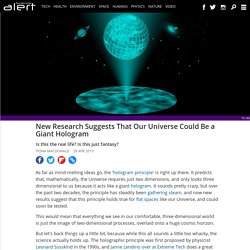
It predicts that, mathematically, the Universe requires just two dimensions, and only looks three dimensional to us because it acts like a giant hologram. It sounds pretty crazy, but over the past two decades, the principle has steadily been gathering steam, and now new results suggest that this principle holds true for flat spaces like our Universe, and could soon be tested. This would mean that everything we see in our comfortable, three-dimensional world is just the image of two-dimensional processes, overlaid onto a huge cosmic horizon. But let's back things up a little bit, because while this all sounds a little too whacky, the science actually holds up.
The holographic principle was first proposed by physicist Leonard Susskind in the 1990s, and Jamie Lendino over at Extreme Tech does a great job of explaining the basic idea: Source: Extreme Tech. [Serious] Redditors who have been clinically dead and then revived/resuscitated: What did dying feel like? Did you see anything whilst passed on? : AskReddit. There are seven types of near-death experiences, according to research. Depending on your beliefs, the experience of death hovers over our lives like an unknowable but inevitable void.
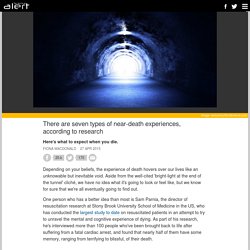
Aside from the well-cited 'bright-light at the end of the tunnel' cliché, we have no idea what it's going to look or feel like, but we know for sure that we're all eventually going to find out. One person who has a better idea than most is Sam Parnia, the director of resuscitation research at Stony Brook University School of Medicine in the US, who has conducted the largest study to date on resuscitated patients in an attempt to try to unravel the mental and cognitive experience of dying. As part of his research, he's interviewed more than 100 people who've been brought back to life after suffering from a fatal cardiac arrest, and found that nearly half of them have some memory, ranging from terrifying to blissful, of their death.
FearSeeing animals or plantsBright lightViolence and persecutionDeja-vuSeeing familyRecalling events post-cardiac arrest "I was terrified. Consensus reality. Consensus reality[1][2] is that which is generally agreed to be reality, based on a consensus view.
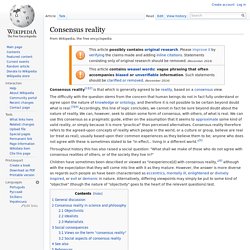
The difficulty with the question stems from the concern that human beings do not in fact fully understand or agree upon the nature of knowledge or ontology, and therefore it is not possible to be certain beyond doubt what is real.[3][4] Accordingly, this line of logic concludes, we cannot in fact be sure beyond doubt about the nature of reality. We can, however, seek to obtain some form of consensus, with others, of what is real. Reality. Not to be confused with Realty.

Philosophers, mathematicians, and other ancient and modern thinkers, such as Aristotle, Plato, Frege, Wittgenstein, and Russell, have made a distinction between thought corresponding to reality, coherent abstractions (thoughts of things that are imaginable but not real), and that which cannot even be rationally thought. By contrast existence is often restricted solely to that which has physical existence or has a direct basis in it in the way that thoughts do in the brain. 10 Scientific Studies That Prove Consciousness Can Alter Our Physical World.